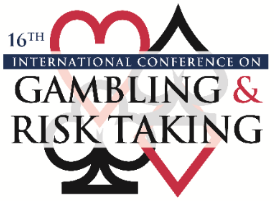Session Title
Session 2-1-A: Assessing Problem Gambling Vulnerabilities through Research
Presentation Type
Event
Location
The Mirage Hotel & Casino, Las Vegas, Nevada
Start Date
8-6-2016 8:30 AM
End Date
8-6-2016 10:00 AM
Disciplines
Mental and Social Health | Sociology
Abstract
Gambling is at the same time all about the money and not at all about the money. Money is the medium and motivation for gambling, but becomes devalued in the game. For problem gamblers, financial concerns may often be among the first recognized signs of the problem, and many of the troubles brought with problem gambling are financial. Nonetheless, the financial well-being in the everyday life of problem gamblers is not yet widely studied, even though a lot is known about the processes inside the mind of a problem gambler. What kinds of practices, meanings and experiences related to money and financial issues problem gamblers have in their everyday life?
Analyzing thematic, qualitative interviews with problem gamblers it is discussed how problem gamblers use money as a medium to exercise control over their gambling: gambling is not merely chaotic, but disposable incomes define the tempo and intensity of gambling. Problem gambling is often about winning back the lost money, but what happens in problem gambler’s life when enabling to chase losses? Furthermore, it is studied how problem gamblers recover financially. Variety of treatment options are available for problem gamblers, but what kinds of survival techniques they have from financial problems? Specific attention is paid on how welfare structures and financial assistance support problem gamblers in the recovery. The results have implications in designing the financial support mechanisms for problem gamblers.
Keywords
Problem gambling, financial problems, well-being, welfare state
Streaming Media
Problem Gambling and Financial Wellbeing: The Experience of Losing, Consuming, and Receiving Money
The Mirage Hotel & Casino, Las Vegas, Nevada
Gambling is at the same time all about the money and not at all about the money. Money is the medium and motivation for gambling, but becomes devalued in the game. For problem gamblers, financial concerns may often be among the first recognized signs of the problem, and many of the troubles brought with problem gambling are financial. Nonetheless, the financial well-being in the everyday life of problem gamblers is not yet widely studied, even though a lot is known about the processes inside the mind of a problem gambler. What kinds of practices, meanings and experiences related to money and financial issues problem gamblers have in their everyday life?
Analyzing thematic, qualitative interviews with problem gamblers it is discussed how problem gamblers use money as a medium to exercise control over their gambling: gambling is not merely chaotic, but disposable incomes define the tempo and intensity of gambling. Problem gambling is often about winning back the lost money, but what happens in problem gambler’s life when enabling to chase losses? Furthermore, it is studied how problem gamblers recover financially. Variety of treatment options are available for problem gamblers, but what kinds of survival techniques they have from financial problems? Specific attention is paid on how welfare structures and financial assistance support problem gamblers in the recovery. The results have implications in designing the financial support mechanisms for problem gamblers.


Comments
Audio recording of this presentation is attached as a downloadable MP3 audio file, 48.5 MB
This presentation begins at 25:04